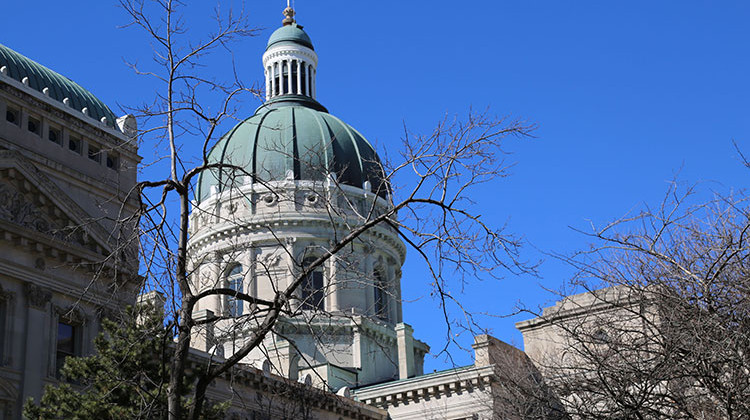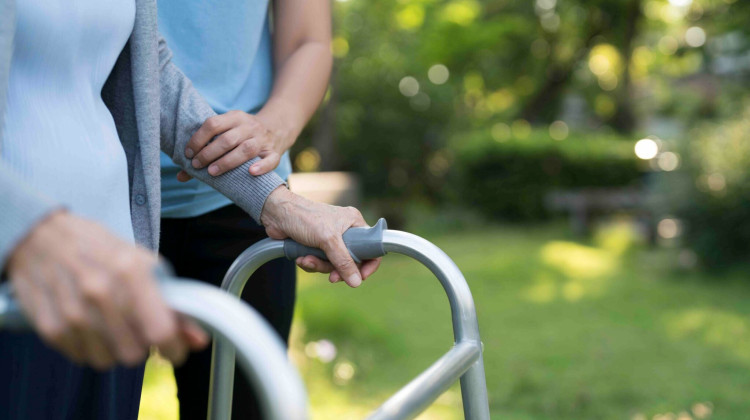Gov. Eric Holcomb signed several executive orders Thursday in repsonse to the COVID-19 pandemic. Among them are an extension of the current state of emergency for an additional 30 days when it expires April 5 and an extension of school closures through May 1.
Here’s a list of action taken by the governor Thursday:
State of Emergency Extension
- The current state of emergency will be extended an additional 30 days when it expires on April 5.
K-12 schools
- All K-12 schools -- public and non-public -- will remain closed until May 1. The date may be revised to extend through the end of the 2019-2020 school year if circumstances warrant.
- All-state mandated assessments will be canceled for the current academic year. The state will pursue any federal waivers needed to cancel the requirements for accountability, chronic absenteeism and state-mandated assessments.
Economy
- Indiana will align with the federal government to delay state income tax payments from April 15 to July 15. The U.S. Treasury extended the deadline to pay federal income tax by 90 days.
- Penalties will be waived for 60 days for property tax paid after May 11. The state will work with counties that may experience cash flow stress because of the delay.
- The state will not immediately move forward with using $300 million in reserves to pay for several capital projects approved during the 2020 legislative session. It will be held for relief efforts and to maintain current services.
- Providers of essential utility services such as gas and electric, broadband, telecom, water and wastewater services are prohibited from discontinuing service to any customer during the public health emergency.
- The state’s application to the U.S. Small Business Administration was approved Wednesday. This program provides targeted, low-interest loans of up to $2 million to help small businesses and nonprofits overcome the temporary loss of revenue as a result of coronavirus.
Unemployment Insurance Benefits
- The state will interpret Indiana’s unemployment laws to the broadest extent possible to cover Hoosiers who are out of work because of COVID-19.
- Benefits will be paid to individuals who file their initial unemployment claims late.
- The Department of Workforce Development will allow individuals to continue to accrue unemployment eligibility if they take work leave because of COVID-19.
- DWD will seek federal authorization to provide unemployment benefits for those who are not otherwise eligible for unemployment, such individuals who have recently started a job.
- For employers, DWD will not assess certain experience rate penalties because of employees who receive unemployment benefits because of COVID-19.
Housing
- No residential eviction proceedings or foreclosure actions may be initiated during the public health emergency. This does not relieve the individual of obligations to pay rent or mortgage payments.
- All public housing authorities are requested to extend deadlines for housing assistance recipients and required documentation to show eligibility for housing programs.
- The Indiana Department of Financial Institutions and Indiana Community Housing Development Authority are required to work with financial institutions to identify tools to help promote housing stability.
Social Services
- Participants in the Healthy Indiana Plan (HIP) and the Children’s Health Insurance Program are not required to make premium payments.
- Job search requirements are waived for those applying for Temporary Assistance to Needy Families (TANF) benefits.
- The Family and Social Services Administration will seek a federal waiver to extend renewals for existing Medicaid and HIP recipients.
- Telehealth services for mental health, substance use disorder and prescribing for Medicaid covered services will be expanded.
Insurance
- The commissioner of the state Department of Insurance will request that insurers institute a 60-day moratorium on policy cancellations for non-payment of premiums. This does not suspend a policyholder’s obligation to make payments.
- The commissioner will ask health insurers to cover COVID-19 testing without requiring prior authorization.
- The commissioner will request that health insurers not increase prices or coverage costs that involve medical care for COVID-19.
Bureau of Motor Vehicles
- To limit the number of in-branch transactions, late fees will be waived for several driver’s licenses and identification card renewals, vehicle registrations, titles, and certain other transactions.
- Other operational changes in branches are being instituted to provide for the safety of employees and customers in branches, such as spacing between terminals and limiting the number of customers in the lobby.
Veterans
- Requirements have been relaxed for veterans to qualify for awards from the Military Family Relief Fund.
- Awards in excess of $2,500 may be approved by the IDVA director during the public health emergency.
Health and Professional Licensing
- Mental health professionals are permitted to practice via telemedicine.
- Advance Practice Registered Nurses are allowed to provide services in multiple locations.
- The state health commissioner may waive requirements of the nursing home certificate of need statute to respond to COVID-19 issues for long-term care facilities.
This is a rapidly evolving story, and we are working hard to bring you the most up-to-date information. However, we recommend checking the websites of the Centers for Disease Control and Prevention or the Indiana State Department of Health for the most recent numbers of COVID-19 cases.
 DONATE
DONATE







 Support WFYI. We can't do it without you.
Support WFYI. We can't do it without you.